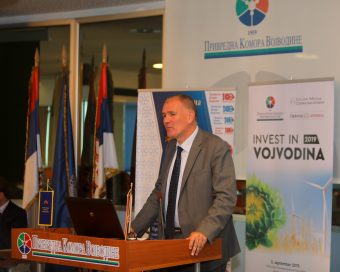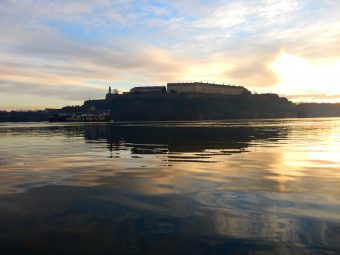Vojvodina has a great potential for energy production from renewable sources. How much these resources will be used, and to what extent industrial entities will be environmentally conscious, depends most on the state, precisely on the legislation, and its consistent implementation points out Zoran Trpovski, MSc, the Secretary of Industry Association at the Chamber of Commerce and Industry of Vojvodina
Through the unique chamber system, the Industry Association of the Chamber of Commerce an Industry of Vojvodina brings together industrial entities operating in the Autonomous Province of Vojvodina (AP Vojvodina). They currently have groups which cover metal complex, energetics and construction and there is the Circular Economy Council. Through these forms of organisation, by applying the prescribed procedure, the Association raises current issues concerning these branches of the industry, and it increasingly addresses the topic of energy efficiency. With Zoran Trpovski, MSc, the Secretary of the Industry Association at the Chamber of Commerce and Industry of Vojvodina, we have talked about how much industrial companies are following the global green trends and standards when it comes to business. Since Vojvodina has the highest number of oil industry facilities and the highest potential of renewable energy sources, we are interested in what is the relation between the greatest environmental risks and benefits in this province.

EP: The modern industry today is unthinkable without clean technologies, renewable, green inventions and circular economy. To what extent does the Industry Association deal with these topics and how environmentally conscious are the industrial production companies in Vojvodina?
Zoran Trpovski: It is difficult to give a global assessment, since the scene is very diverse, especially if we bear in mind that the awareness of people, when it comes to the importance of industry as a whole, is re-created after a long period, in the sense that production is necessary to create new value. It is certain that every company tries to follow and implement the current trends in its field. Regarding ecology, regulation is the key, and consistent application of regulations can impose environmental awareness of all industrial entities. I think there is a similar analogy with citizens and their environmental awareness since owners or responsible persons in companies are citizens in the first place and then the persons from those companies. Either you have the awareness, or someone has to “make” you raise it. Within the new concept of work of the Chamber of Commerce and Industry of Vojvodina, both in the Industry Association and the Chamber as a whole, the importance of these issues has been recognised, and I am sure that they will be even more significant in the future.
EP: It was established once refineries and wastewater were the largest polluters in Vojvodina. Do you know what the black ecological spots on the industrial map of Vojvodina are?
Zoran Trpovski: There is now one refinery in the Vojvodina, and it has constantly being pointed out that new owners have invested significant funds in modernisation and advancement of technology, especially for the increase the depth of oil refining. Considerable funds have directly been invested in environmental protection, and a higher proportion of fuels with lower sulfur content further contribute to less pollution. Still, the question of oil wells remains, since they carry a certain environmental risk, and the refinery in Novi Sad, that no longer operates, but that was as well as Pacevo refinery, unfortunately the target of bombing during the NATO aggression on our country. In recent years, people have been mentioning the pollution that occurred during the aggression, which is still affecting the environment. Wastewater is a general problem throughout the country and Vojvodina is no exception. Our lagging behind in environmental protection can be best observed in this area. The Chamber of Commerce and Industry of Vojvodina is fully involved in these issues through the Energy and Energy Mining Group of the Industry Association, as well as other forms of organisation, especially through the recently formed Circular Economy Council.
EP: At the end of the October last year, the Chamber hosted the International Clean Energy Technology Forum. What are the specific activities and successful local projects that indicate that Vojvodina is heading towards the development of clean technologies?
Zoran Trpovski: This was the 13th Forum and the Chamber is the traditional host of the second day of the conference. The main merit for the traditional maintaining of the forum and having burning topics belongs to Mr Tihomir Simic and his associates. The last Forum was dedicated to Serbia’s energy digital perspective. There were many real-life examples on the second day, such as heat pumps, solar energy and other renewable energy, and a special session was devoted to the field of refrigeration. Traditionally, after this gathering, the conclusions and recommendations were sent to the decision-makers. Moreover, when it comes to the Chamber’s standalone activities, we are very proud of the International gathering held in 2018 and organised by the Energy and Energy Mining Group, which was dedicated to all aspects of biomass utilisation.
EP: What is the perspective of the fossil fuel processing industry in Vojvodina, and what is the perspective of renewable energy sources?
Zoran Trpovski: When it comes to fossil fuels, the company that performs the exploitation knows the answer to this question. Depending on the market trends in consumption patterns, circumstances in the world and other elements, future exploitation will be realised. When it comes to renewable energy, Vojvodina is a part of our country that has excellent conditions for the development of wind, solar and biomass energy production. Depending on the policy of the state, in terms of implementing the obligations of the defined participation of these sources in gross final consumption, as well as on the initiative of private investors in this field, it depends how much cleaner energy we will produce.
In focus:
EP: One of the topics on which the Chamber of Commerce and Industry was working last year was the circular economy. How much has the industry of Vojvodina turned to this global trend, which involves, above all, energy and raw material efficiency?
Zoran Trpovski: As already mentioned, over the last year, we formed the Circular Economy Council, with the desire to influence certain environmental issues and transition from linear to a circular economy at the Province level. Special attention will be paid to responsible waste management, as it is generated daily in our homes as well as in all sectors and segments of industrial production. Every day we witness that businesses are implementing projects of energy efficiency, efficient use of raw materials and others, which affect their financial position and at the same time they also have a positive impact on the environment. There are many good examples, and perhaps it should be noted that biogas power plants, whose development is extremely significant since, in addition to energy production, they provide us with high-quality organic fertilizer.

EP: Which funds are at disposal to the industry of Vojvodina for the transition to clean technologies and energy efficiency?
Zoran Trpovski: Quite a large number of institutions are involved in financing energy efficiency projects. These institutions define the conditions of use of these lines, and that significantly ensures the earmarked use. At the same time, different levels of government, from local, provincial to republican finance individual segments in this area. Finally, and perhaps most importantly, the industrial entities themselves invest in this area to reduce costs and improve the productivity of their businesses.
EP: How much do you cooperate with the Chambers of Commerce of Hungary, Romania and Croatia as your closest neighbours? How much can we apply their experience in the environmental advancement of the industry, since all those countries are the EU Member States?
Zoran Trpovski: We try to take every opportunity to present positive experiences of neighbouring countries in this field. That is sometimes done through colleagues in the Chambers of Commerce, i.e. representative offices of Croatian Chamber of Commerce in Belgrade, but very often through Embassies, among which the Embassy of the Republic of Slovakia stands out. Very often, business entitiesfrom numerous counties, which are involved in these activities offer their services. Between above mentioned countries, we have had several successful gatherings organised together with our Hungarian colleagues.
EP: Which activities does the Chamber of Commerce of Vojvodina plan for the current year to encourage more intensive development of the “green” industry?
Zoran Trpovski: The stakeholders in this area should be Energy and Energy Mining Group and the Circular Economy Council. These bodies will organise appropriate gatherings and events to develop this segment and inform a wide range of subjects about the current events. We will always be ready to assist in the implementation of all projects in this field by connecting them with decision-making institutions. Besides, very good cooperation with governmental institutions should lead to joint actions in organising public hearings, panels and roundtables which should increase the perception of the public and entities when the topics from these areas are on the agenda.
Interview by: Nevena Djukic
This article was published in the new issue of the Energy portal Magazine NATURAL RESOURCES, march – may, 2020



